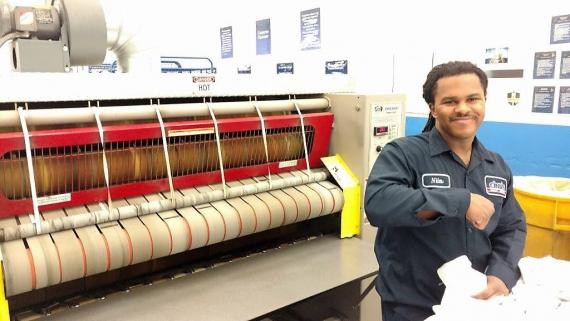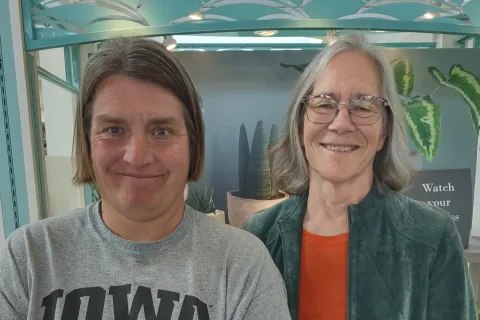Good work that's good for business
October 22, 2018With the expertise of disability consultants at ADVICE, and support from NEXT for AUTISM and Autism Speaks, companies such as CINTAS and QUEST DIAGNOSTICS have set up comprehensive, professional programs to hire, integrate and retain people with autism. In the process, they’ve learned that diversity is good for individuals and good for business. This post is an update on their progress.
In a recent interview at work, Ellie*, a 27 year old employee with autism, became overwhelmed with emotion when she was asked what it had been like to search for a job. Virtually impossible, Ellie had suggested. Until she landed her current position as a Pre-Analytical Assistant at Quest Diagnostics, Ellie’s only other job was in a doggie day care facility. She longed to work in biology, her major in college, but struggled to find suitable employment.
Ellie is one of many adults with autism who, having gotten through college, face barriers to employment due to their diagnosis, which can manifest in a work setting as awkwardness during interviews or challenges with communicating, among other characteristics. Thanks to accommodations and job coaching facilitated by such companies as Quest Diagnostics, workers like Ellie can thrive and often surpass expectations.
“Ellie comes in, I don’t care what is going on, her goal is to complete her job,” reported her supervisor Tina Lewis-Sine. Dedicated and conscientious, Ellie always looks for more work immediately after she finishes a task. She is never a minute late when returning from lunch, according to Ms. Lewis-Sine. Asked how she manages to be so punctual, Ellie explained that she sets the timer on her watch to go off just before the end of her break, so that she can always get back to work on time.
“One of the things we’ve found about people with ASD (autism spectrum disorder) is that they take their work very seriously,” said Linda Behmke, Quest Diagnostic’s Sr. Project Manager of Employee Relations. “People like Ellie work at a level above everybody else in the labor pool. They up the ante for all of our co-workers!”
This is no surprise to James Emmett, Lead Consultant at ADVICE, a team of national disability employment consultants that worked with Quest Diagnostics to implement a comprehensive hiring, retention, and job training program for workers with ASD and other developmental disabilities.
“People with autism are an underutilized segment of the workforce,” Mr. Emmett said. “And it’s not just those with college degrees or high-level skills who are qualified to work, people with a range of abilities can be enabled, through training and supports, to work in a variety of jobs.”
According to Mr. Emmett, a growing number of national companies have been adopting disability employment practices. They understand that hiring workers with developmental disabilities such as autism is not only a good thing to do, it’s also good for business.
“This initiative is helping our bottom line by addressing key issues that we’ve struggled with in the past: turnover, productivity, and quality goals,” added Ms. Behmke at Quest Diagnostics. With the support of ADVICE consultants, the company has seen lower turnover, higher productivity, and an overall improvement in the quality of work. Ms. Behmke added that the work with ADVICE has genuinely enriched the culture by instilling greater cohesion and pride in the work and workplace.
“This work helps build our workforce pipeline and it builds our brand,” added Takiyah Cunningham, Manager of Diversity Programs & Partnerships at CINTAS, the national uniform provider. CINTAS has embraced the work of ADVICE-trained consultants in more than 100 sites across the country, where they have facilitated integration practices, sourced employees and trained existing departments to successfully integrate colleagues with autism. “They’ve helped us to really penetrate our company with the necessary education and tools to make our workplace diverse and inclusive,” according to Ms. Cunningham.
To date, consultants mentored and trained by ADVICE have created more than 400 jobs for people with ASD at companies such as CINTAS, Staples and Meijer, and Quest Diagnostics. They provide customized, disability employment integration programs that include implementing successful hiring practices and cost-effective enhancements; holding workshops for supervisors and co-workers about autism to better support a cooperative, respectful and productive work culture; and sourcing qualified candidates from a wide provider network.
“It’s been a learning experience for all of us here at Quest,” said Ms. Behmke of her company’s work with ADVICE. For example, Quest has adjusted its interview processes to ask more concrete questions and accommodate a wider range of personalities. It has modified workspaces with visual cues. Entire departments have undergone training and internal conversations in order to help everyone overcome preconceptions and become more aware of how to integrate workers with autism.
“Our goal was to create capacity within companies to make the cultural, operational, and protocol changes that would lead to a more successful and productive work environment for people with autism and those with other developmental disabilities,” said Ilene Lainer, president of NEXT for AUTISM which, with Autism Speaks, helped launch ADVICE along with the Poses Family Foundation.
Another goal was to enlist large companies that could offer a variety of job types to workers with a range of disabilities. “There are certain companies with targeted hiring initiatives for tech jobs, but people with autism have a range of abilities, beyond tech, that can be accommodated by larger companies. These companies just need the right kind of support from consultants like the ones ADVICE has trained,” said Lisa Goring, Chief Program and Marketing Officer at Autism Speaks.
The outcome has been surprising. Ms. Behmke reports that coworkers have embraced the initiative and responded positively to the training. It’s helped them understand that colleagues with ASD can be folded into teams and improve productivity, instead of weighing down the workplace as some of them had assumed.
“This effort has instilled a level of pride across the company,” added Ms. Cunningham at CINTAS. “People have gotten on board with this because they see that they are part of a company that cares about everyone.”
*Real names of those w/ ASD have been changed for privacy reasons
For more information, please visit NEXT for AUTISM, Autism Speaks, and ADVICE.









